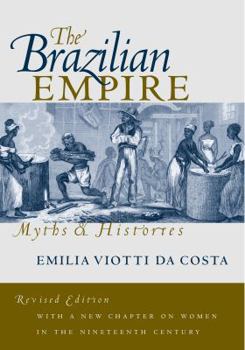The Brazilian Empire: Myths and Histories
Select Format
Select Condition 
Book Overview
This classic work is must reading for anyone who would understand Brazil and Latin America, past and present. First published in 1985 and now expanded to include a new chapter on women in Brazilian history, the book explores the social, political, economic, and intellectual currents that shaped nineteenth-century Brazil and whose reverberations continue to be felt throughout contemporary Brazilian society.
Placing her findings in a rich comparative context with regard to U.S. history, Emilia Viotti da Costa concentrates on crucial moments in Brazilian history to shed light on a number of vexing questions: Why in a nation so rich in material resources is there so much poverty? How was slavery abolished without bloodshed in a country where slaves had represented the main labor force for almost four hundred years? Why did self-described liberal elites twice lead the country toward authoritarian regimes? In exploring these and other puzzles, she uncovers the realities behind many of the persistent myths surrounding the Brazilian empire.
Placing her findings in a rich comparative context with regard to U.S. history, Emilia Viotti da Costa concentrates on crucial moments in Brazilian history to shed light on a number of vexing questions: Why in a nation so rich in material resources is there so much poverty? How was slavery abolished without bloodshed in a country where slaves had represented the main labor force for almost four hundred years? Why did self-described liberal elites twice lead the country toward authoritarian regimes? In exploring these and other puzzles, she uncovers the realities behind many of the persistent myths surrounding the Brazilian empire.
Format:Paperback
Language:English
ISBN:0807848409
ISBN13:9780807848401
Release Date:February 2000
Publisher:University of North Carolina Press
Length:352 Pages
Weight:1.17 lbs.
Dimensions:0.8" x 6.0" x 9.0"
Customer Reviews
1 rating
A Revisionist History that's a Primer too!
Published by Thriftbooks.com User , 18 years ago
The title says it all. The book is concise and informative as da Costa refutes long-held views about Brazilian history by focusing, largely, on the ruling classes. While this is an interesting and controversial way to do history with the primacy of subaltern studies in historical research, da Costa's microscopic focus on the elite left something to be desired. We want to hear the voices of the poorer classes. Nonetheless, the book raises interesting questions about the Brazilian upper classes' agency in modern Brazil's startling rich/poor dichotomy. While the dependency school of history claims that this was created in large part by European and North American multi-national corporations, da Costa argues that modern Brazil's issues are in large part the creation of the Brazilian elite themselves, who do anything and everything possible to keep the masses down--including allying themselves with aforementioned multi-nationals. PROS: concise, informative and pithy especially as it explores the "myth of the helpless woman." CONS: It could have been longer, including the effects of the Brazilian elites actions on the lower classes.






